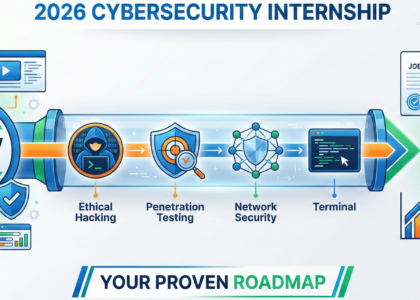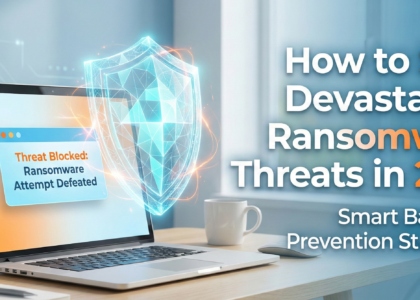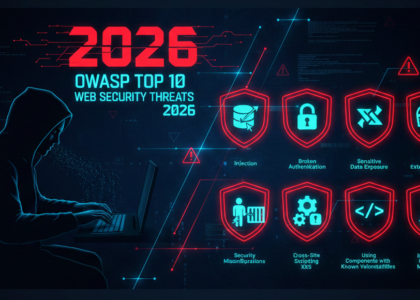How to Start Your Cybersecurity Journey as a Student
Introduction
Cybersecurity is one of the fastest-growing and most in-demand fields today. With increasing cyber threats, companies and organizations are looking for skilled professionals to protect their data. If you’re a student interested in cybersecurity, now is the perfect time to start your journey. The best part? You don’t need a degree to begin—just curiosity, dedication, and a willingness to learn.
In this guide, we’ll break down the key steps to help you start your cybersecurity career as a student.
1. Understand the Basics of Cybersecurity
Before diving deep, it’s essential to understand what cybersecurity is and why it matters. Cybersecurity involves protecting systems, networks, and data from digital attacks. Here are some key concepts to start with:
- Malware and Viruses
- Phishing Attacks
- Encryption
- Firewalls and Network Security
- Ethical Hacking
You can explore free resources like Coursera, Udemy, and YouTube to get an introduction to these topics.
2. Learn Networking and Operating Systems
A strong understanding of networking and operating systems is crucial for cybersecurity. Here’s what you should focus on:
- Networking Basics – Learn about TCP/IP, DNS, VPNs, and Firewalls.
- Operating Systems – Get familiar with Windows, Linux, and MacOS.
- Command Line Basics – Learn how to use the terminal in Linux and PowerShell in Windows.
Free courses like Cisco’s Networking Academy or CompTIA Network+ can help you get started.
3. Get Hands-On with Cybersecurity Tools
Theoretical knowledge is important, but hands-on experience is essential. Try experimenting with the following tools:
- Wireshark – Network analysis tool
- Burp Suite – Web application security testing
- Metasploit – Penetration testing tool
- Kali Linux – A specialized Linux distribution for cybersecurity professionals
You can practice using these tools in a safe environment like Hack The Box, TryHackMe, or OverTheWire.
4. Start Ethical Hacking and Capture The Flag (CTF) Challenges
CTF competitions are a fun and practical way to learn cybersecurity skills. These challenges simulate real-world security problems and help you improve problem-solving skills. Popular CTF platforms include:
- Hack The Box
- TryHackMe
- CTFTime
Participating in these competitions will help you build a strong foundation in ethical hacking.
5. Earn Cybersecurity Certifications
Certifications can boost your resume and increase your chances of landing a job or internship. Some beginner-friendly certifications include:
- CompTIA Security+ – Covers fundamental security concepts
- Certified Ethical Hacker (CEH) – Focuses on ethical hacking techniques
- Google Cybersecurity Professional Certificate – A great starting point for beginners
6. Join Cybersecurity Communities and Network
Networking with other cybersecurity enthusiasts can help you learn and grow. Join online forums and communities such as:
- Reddit (r/cybersecurity, r/netsec)
- Discord servers for cybersecurity learners
- LinkedIn groups focused on cybersecurity
- Attend local or online cybersecurity events and conferences
Engaging in discussions and asking questions will help you stay updated on industry trends.
7. Work on Cybersecurity Projects
Practical experience is valuable in cybersecurity. Start working on small projects like:
- Creating a personal firewall
- Setting up a secure web server
- Developing your own penetration testing scripts
- Writing cybersecurity blogs to share your knowledge
Showcasing your projects on GitHub or a personal website can help you stand out to potential employers.
8. Apply for Internships and Entry-Level Jobs
Gaining hands-on experience through internships is a great way to start your career. Look for opportunities at:
- Cybersecurity firms
- Tech companies
- Government agencies
Websites like LinkedIn, Indeed, and Glassdoor are great for finding cybersecurity internships.
How Cybknow Can Help You
Cybknow provides expert-led cybersecurity training, hands-on workshops, and real-world challenges to help students build their skills. Whether you’re a beginner or looking to advance your knowledge, Cybknow’s resources can guide you on your cybersecurity journey.
Conclusion
Starting a cybersecurity career as a student may seem overwhelming, but taking small steps can lead to great opportunities. Keep learning, practice consistently, and stay curious. Cybersecurity is a field where passion and persistence matter the most. Start today, and soon you’ll be on your way to becoming a cybersecurity expert!





